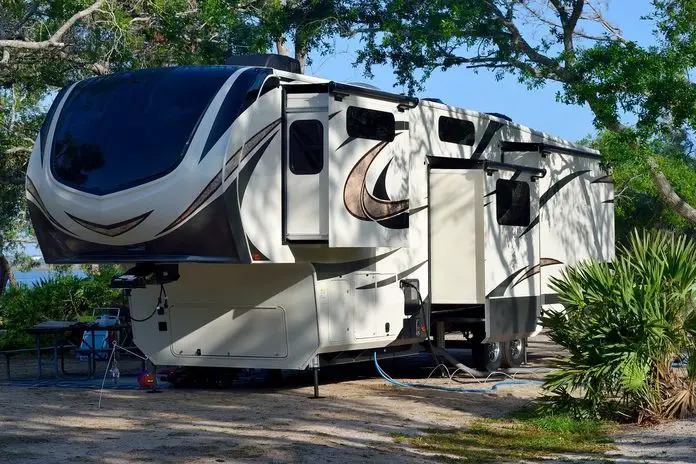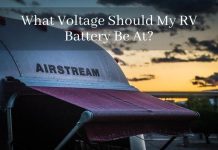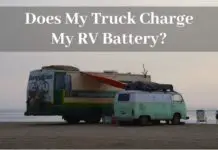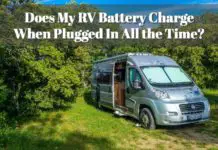
Camping but suddenly your RV battery died or got discharged? Do not fret. There is a way out of this predicament. The purpose of getting an RV is to make camping as enjoyable and hassle free as possible.
If and when your battery dies, most, if not all of the modern conveniences made available by an RV will be unusable. Read on as I have compiled some few easy steps to charge your battery.
So how do you charge a dead RV battery with a generator? First off, charging via a generator is not the most effective way of charging your battery. It is always best to go camping prepared so as to enjoy your trip to a maximum. Listed below are preventive measures as well as steps on how to re-charge your batteries.
Here’s a list of preventive measures:
1. Make yourself aware of the size and type of battery your RV is equip with. Certain specifications are important in considering which generator would work best with your RV battery.
2. Buy a portable generator if your RV does not have a built in portable generator.
3. Make sure that your portable generator has enough fuel to power it up should there be a need to charge your battery.
4. Ensure that your RV battery and your generator is fully charged prior to your trip.
5. Ensure to exercise proper maintenance activities on your RVs. See below for more details on this.
Here is the step by step how to charge a rv battery using a generator:
1. Unplug all appliances inside the RV such as microwave, toasters, stereos and other equipment that uses electricity.
2. Turn off the engine.
3. Engage the vehicle’s emergency break.
4. If your generator is not fully charged, ensure that your generator is plugged in to an AC outlet at around 120 volts.
5. Assuming that you have a well-maintained battery, you can go ahead and plug your RV battery unto the generator.
One important thing to remember is to not charge your RV battery using the built in 12 volts output. It is not recommended to use these built in outputs to charge your RV batteries.
Charging your RV battery this way will take a long time and also has the possibility to damage your battery. The output voltage may fluctuate and is normally not suitable for charging batteries.
Do note that charging your batteries using a generator is a very slow process and weather can also affect the charging speed. It is likely to take about 2 hours to charge your RV battery provided that it is not depleted and the generator is connected to an AC outlet.
You might ask, what specifications of a generator do I have to particularly look for? I have done a bit of research on this topic, see below!
Factors To Consider In Purchasing A Generator
Generators are easily available for purchase at any hardware store. Buying the wrong one is as useless as not having one at all. Therefore, it is important to know how and when they would be used.
1. The bigger the generator, the better
You do not need to buy industrial type generators. These are the generators that are bulky and make a lot of noise. Buying this kind of generator would not make any sense since you have very limited space in your trailer. For charging your RV batteries, you can settle for those portable types.
Portable generators are much smaller but the bigger your portable generator is, the faster it can charge your RV battery. Normally, bigger generators can generate larger Amp output and in effect can charge your batteries faster.
2. Use a Smart Multi Stage Battery Charger
Generators can help power up most electrical equipment but certain equipment requires specific conditions to be met for it to be charged efficiently. A Smart Multi Stage Battery charger is an additional tool you can hook up to your generators to help charge your RV batteries efficiently and effectively.
This might cost you more, cash-wise, at the onset but would save you a lot of time in the long haul for it will definitely help you charge your RV battery faster. This would also give you a longer battery life because it stabilizes the amount of power it is giving off when charging your RV battery.
3. Determine fuel type
There are Diesel powered and Gasoline powered generators. Diesel powered generators has more advantages than the latter but the latter is easier to come by. Diesel powered generators are much more efficient thus ensuring it will run longer. They require less maintenance as well.
Conducting proper maintenance on your RV battery is much more cost effective in the long run rather than buying a new battery every 1 or 2 years. A well-maintained battery can actually last you 5 to 7 years.
It is highly encouraged to take care of your RV batteries as it is not only cost effective but also involves minimal effort and consumes a small amount of your time.
Here are some of the factors that can cause battery failure and how to prevent them:
1. Charging And Discharging
Battery charge drop should always be above 10.5 volts and should not be below 50%. If the battery goes below 20%, your battery will no longer be able to function at 100% again. It is important that the battery does not stay in a low batter charge for a long time to prevent sulfation.
It is also equally important to make sure that the battery is not overcharged and weather plays a big role in a battery’s maintenance. Hot days can overcharge batteries. Cold days can freeze batteries. To prevent batteries from freezing, it is advisable to remove the batteries from the RV.
To prevent overcharged batteries, they should be checked regularly and distilled water should be added as needed so as to keep the electrolyte at a healthy level.
For safety purposes, always wear rubber gloves and eye protection such as googles when handling lead-acid batteries. It is also known that at 122 degrees Fahrenheit, battery capacity increases by 12%.
2. Parasitic Loads
Ever found yourself scratching your head wondering why your RV battery got drained even though you are sure you have turned off all electrical equipment in your RV? This may have been caused by slow draining electrical units such as stereo clocks, TV antenna booster, gas leak detector and/or electronic circuit boards.
These units are called parasitic loads. RVs are known as a recreational vehicle and are commonly stored away every winter. Normally, the RV battery discharges 10% every month when not in use.
It is advantageous if your RV has a battery disconnect switch for you would only need to make sure that the switch is off if you are putting your RV into storage.
3. Corrosion
Even batteries of highest quality cannot escape corrosion if it is not properly maintained. Ill-maintained batteries can cause voltage drop and decrease in amperage output which can ultimately lead to a discharged battery. Look for greenish blue or white powder around the wire connections. Should you find any, it is a sure sign of corrosion.
How To Remove Or Prevent Corrosion From Your RV Battery
Step 1: Prepare the following tools – wire brush, pliers, baking soda solution, water, clean cloth, wrench, screwdriver, petroleum jelly or grease, sandpaper and spray container.
Step 2: Mix ¼ cup of baking soda with 1.5 cup of water.
Step 3: Detach the cables from the negative terminal first then the positive terminal using a wrench and a screwdriver.
Step 4: Apply the baking soda solution using a brush or spray it on the terminal. Let it sit for at leaset 5 minutes. If corrosion is already present, brush it off using a wire brush or a sandpaper then rinse with water.
Step 5: Wipe it dry using a clean cloth.
Step 6: Reconnect the cables starting with the positive terminal first then proceed with the negative terminal again using a wrench and a screwdriver.
Step 7: Coat the exposed metal area of the terminal with grease or petroleum jelly. This would assist in slowing down the formation of corrosion deposits.
With or without corrosion, this should be done once a month!
• Bulged, Discolored or Cracked Battery Casings. Such batteries should immediately be replaced for there might be something internally wrong with it. Always check on your battery’s physical appearance prior to doing any activity such as maintenance work or charging with it.
• Connections. A loose connection can disrupt the performance of your batteries thus it is highly important to regularly check for loose connections and tighten them as necessary.
Final Thoughts
There are also other ways to charge your RV batteries aside from a generator. You can also invest on converters and solar panels. Do not let a dead RV battery ruin a good vacation with family because charging your RV battery using a generator is easy, effective and efficient.





